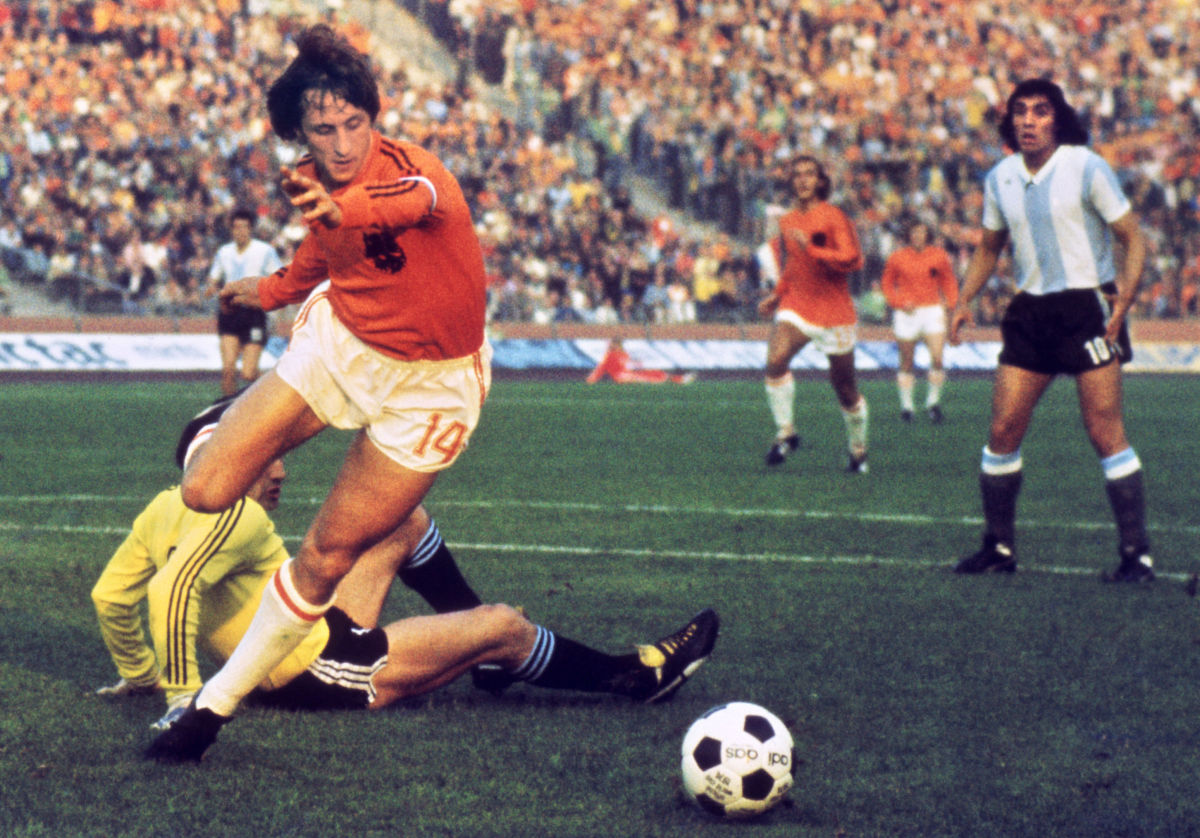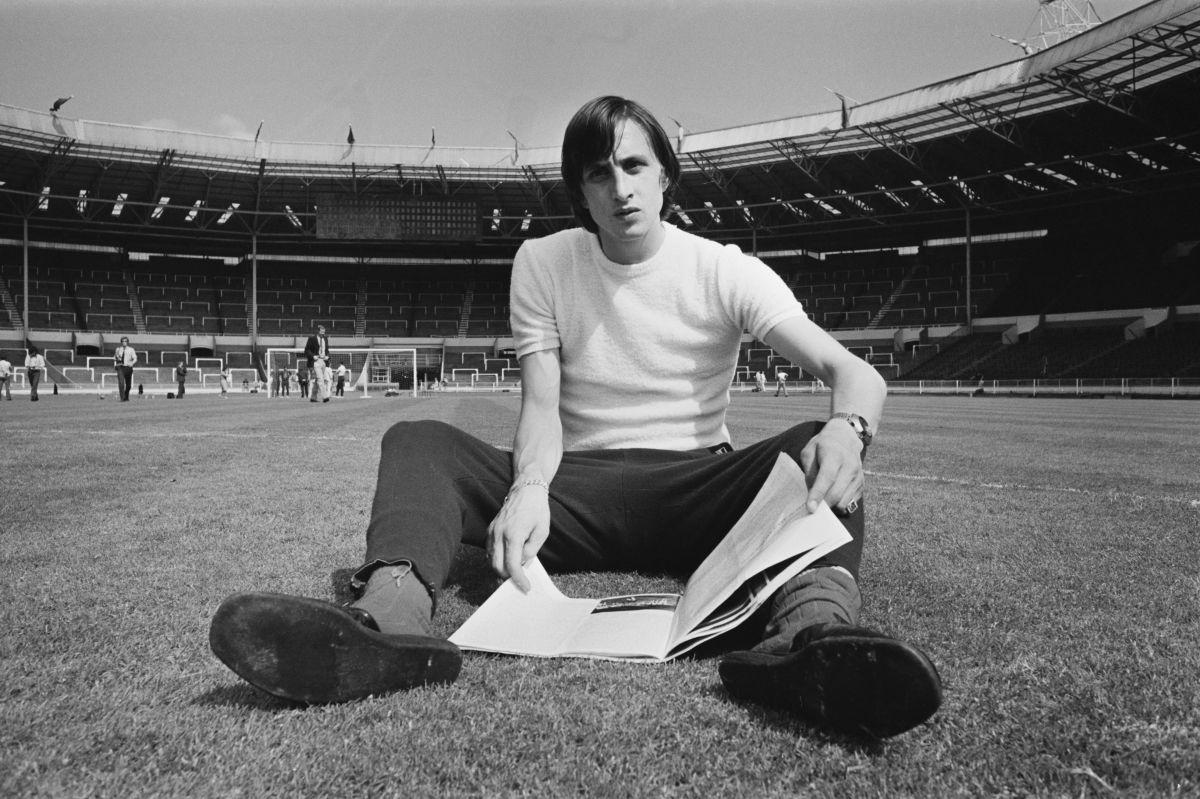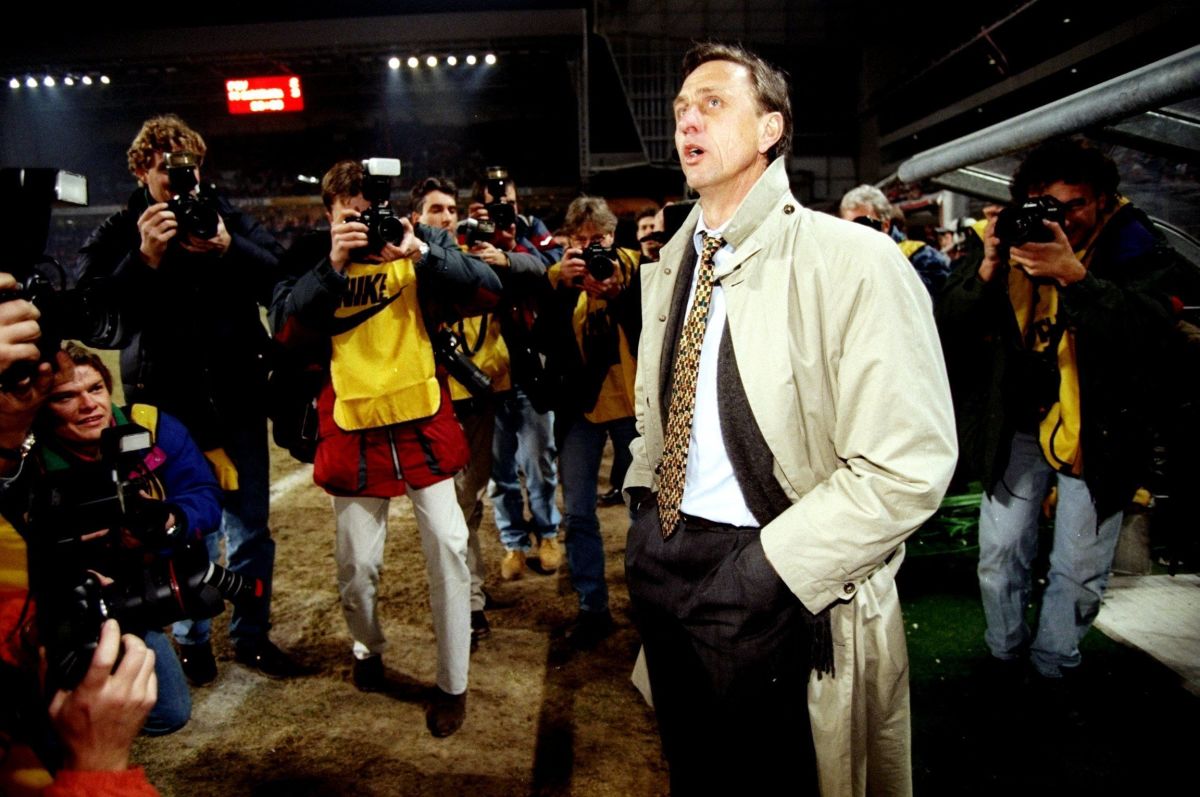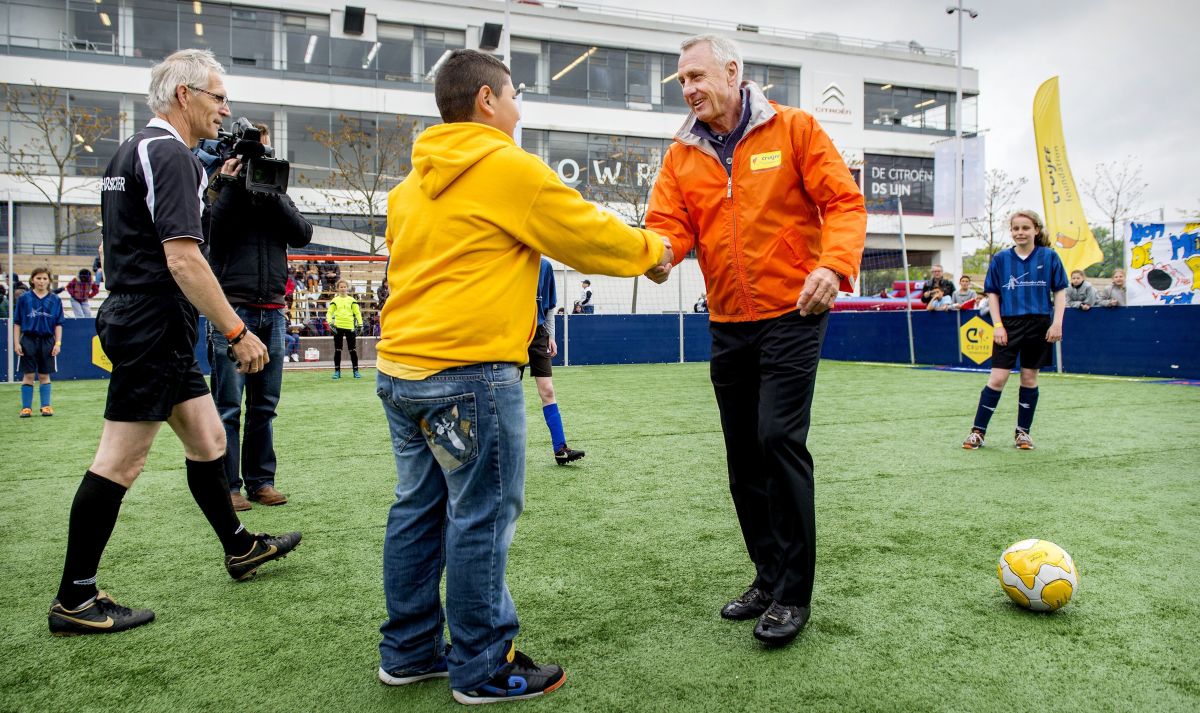Johan Cruyff: The Visionary Who Became the Most Important Man in the History of Football

Johan Cruyff is number 6 in 90min's Top 50 Great Managers of All Time series. Follow the rest of the series over the course of the next week.
If you were looking to describe the late great Johan Cruyff in a single word...'legend', 'icon', 'pioneer', 'master' are all good options. But perhaps 'visionary' would be the one that best illustrates the career of one of the greatest minds ever to grace the sport of football.
As a player, Cruyff is the among the very best of all time.
At Ajax he won 17 major trophies, including three consecutive European Cups. Individually, he collected three Ballon d'Or awards, the last in 1974 as he starred for the Netherlands at summer's World Cup when the 'Total Football' born in Amsterdam went global.

His 1973 transfer to Barcelona was for a world record fee and he continued to win trophies in Spain. A glitzy spell in the United States followed, before a second spell at Ajax in the early 1980s, and a final season with rivals Feyenoord, whom he inspired to domestic glory.
He became Ajax coach in 1985 and moved on to Barcelona in 1988, overseeing the 'Dream Team' era that yielded four consecutive La Liga titles in the early 1990s and the club's first ever European Cup.
Cruyff was a contemporary of both Pele and Diego Maradona during his playing career, while he managed at a time when Arrigo Sacchi, Fabio Capello and Franz Beckenbauer enjoyed great success. Yet his overall reach extends far further than any of them.
For Cruyff's lasting legacy that will continue to influence countless future generations is arguably more important than the great successes he achieved himself as a player or manager alone.
Career Honours |
|---|
KNVB Cup (1985/86, 1986/87) |
UEFA Cup Winners' Cup (1986/87, 1988/89) |
Copa del Rey (1989/90) |
La Liga (1990/91, 1991/92, 1992/93, 1993/94) |
Supercopa de España (1991, 1992, 1994) |
European Cup/Champions League (1991/92); runner-up (1993/94) |
UEFA Super Cup (1992) |
Cruyff was guided throughout his playing career by the great Rinus Michels, working together at Ajax, Barcelona, Los Angeles Aztecs and at the 1974 World Cup. It was Michels who is credited with developing the 'Total Football' model that focused on fluidity and built on the success of the Austrian 'Wunderteam' of the 1930s and Hungary's 'Magical Magyars' of the 1950s, with Cruyff and 'Total Football' in turn influencing the eventual establishment of 'Tiki-taka' at Barcelona.
Upon taking over as Ajax coach in 1985, Cruyff was immediately a success. He didn't claim an Eredivise title, but two KNVB Cups in two years were also accompanied by the UEFA Cup Winners' Cup in 1986/87, the club's first European trophy since Cruyff himself was a player.
Evolving 'Total Football', the system Cruyff implemented at Ajax remained in place, while he also had a major influence reenergising the club's academy training and youth recruitment. Several years later, Louis van Gaal guided a new golden generation to Champions League glory under in 1995. Ajax still continue to be a world leader in youth development.

When he arrived back at Barcelona in 1988, a decade after leaving as a player, Cruyff was tasked with an enormous rebuilding job. The club was at its lowest ebb, beset by debt, poor results, worse performances and a toxic atmosphere. But the Dutch master, by this point still just 41 years of age, was able to completely transform Barça within a few years and create lasting change that serves the club to this day and will continue to do for generations to come.
Returning to what he had known as a player and as a continuation of his work at Ajax, Cruyff overhauled Barcelona's whole tactical system. But his changes went far beyond simply coaching the first team, implementing a club-wide model that ensured players at every level were drilled in the same skills, techniques and way of playing.
The young talents were there to be moulded because of Cruyff himself. He is credited as the father of the club's famed La Masia academy, first pitching the idea of a copy of the Ajax youth setup he had known back home to then president Josep Nunez in 1979. By the time Cruyff returned in 1988, the fruits of the system were emerging and he could further develop the talent.
Pep Guardiola is the most famous of the local players he nurtured. Legend has it that Cruyff saw a 17-year-old Guardiola playing on the right side of midfield for the youth team in his very week as coach in 1988 and instantly insisted the youngster move into a central role. Four years later in 1992, a 21-year-old Guardioa played there as Barcelona won a first ever European Cup.
[Classic Players] Pep Guardiola // 1992 European Cup Final Barcelona v Sampdoria at Wembley pic.twitter.com/x2ezCLUy9h
— Classic Football Shirts (@classicshirts) July 27, 2016
Albert Ferrer was another home grown European Cup winner and a firm part of the 'Dream Team' that Cruyff built, while Sergi Barjuan came a little later. The academy that Cruyff established and perfected would later yield Lionel Messi, Xavi, Andres Iniesta, Gerard Pique, Carles Puyol, Sergio Busquets, Cesc Fabregas, Victor Valdes, all legends of their generation.
In addition to moulding Barcelona's own talent, Cruyff assembled a side of domestic and international stars. Txiki Begiristain, Jose Mari Bakero, Julio Salinas, Eusebio Sacristan, Miguel Angel Nadal and Andoni Goikoetxea were among the Spaniards brought in. Cruyff also plucked Ronald Koeman from his old Ajax team and added Hristo Stoichkov and Michael Laudrup.
By the time Barcelona were crowned European champions in 1992, goalkeeper Andoni Zubizarreta and veteran defender Jose Ramon Alexanko were the only survivors pre-1988.
Early success had come in the form of UEFA Cup Winners' Cup in 1989 and a Copa del Rey in 1988. Barcelona dominated Spanish football in the early 1990s, winning four straight La Liga titles between 1990 and 1994. The 'Dream Team' also returned to Europe's showpiece event in 1994 when they faced AC Milan in the newly rebranded UEFA Champions League final. The 4-0 loss that night Athens remains one of the all-time great shocks in European club football.

"Without him I wouldn't be here," Guardiola, himself now one of the all-time great managers, said of Cruyff in an interview with The Guardian in 2016.
"Before he came we didn't have a cathedral of football, this beautiful church, at Barcelona. We needed something new. And now it is something that has lasted. It was built by one man, by Johan Cruyff, stone by stone. That's why he was special."
Teams Managed | Years |
|---|---|
Ajax | 1985 - 1988 |
Barcelona | 1988 - 1996 |
Catalonia | 2009 - 2013 |
Cruyff's one regret was that he was never able to manage at international, considering it the only thing missing. He did lead the Catalan national team for its exhibition games between 2009 and 2013, but he missed out on the opportunity to lead the Netherlands at the 1990 World Cup.
The Dutch were reigning European champions at the time and Cruyff himself acknowledged in his 2016 book 'My Turn' that he 'expected' to be appointed. He had even nurtured star players Ronald Koeman, Marco van Basten, Frank Rijkaard as Ajax coach and was a teammate of a young Ruud Gullit at Feyenoord. But Michels, then serving on the technical board, inexplicably overlooked him.
With Barcelona's 'Dream Team' era at an end, Cruyff was only 49 years of age when he permanently left full time management in 1996. yet his influence was not over. He went on to create the 'Johan Cruyff Institute' to educate athletes and business professionals in sports management, while, his 'Cruyff Courts' have provided invaluable opportunities for young players from all over the world to play the game they love.

In 'Barcelona: The Making of the Greatest Team in the World', Spanish football writer Graham Hunter stated Cruyff is "...pound for pound, the most important man in the history of football."
There isn't really a better final sentence to describe the visionary that was Johan Cruyff.
Number 50: Marcelo Bielsa - El Loco's Journey From Argentina to Footballing Immortality in Europe
Number 49: Vic Buckingham - How an Englishman Discovered Johan Cruyff & Pioneered Total Football
Number 48: Claudio Ranieri: A Ridiculed Tinkerman Who Masterminded One of Football's Greatest Ever Achievements
Number 47: Bill Nicholson: Mr Tottenham Hotspur, the First Double Winning Manager of the 20th Century
Number 46: Sven-Goran Eriksson: The Scudetto Winning Shagger Who Never Solved the Lampard-Gerrard Conundrum
Number 45: Sir Alf Ramsey: The Man Behind the 'Wingless Wonders' & England's Sole World Cup Triumph
Number 44: Antonio Conte: An Astute Tactician Whose Perfectionist Philosophy Reinvented the 3-5-2 Wheel
Number 43: Kenny Dalglish: The Beacon of Light in Liverpool's Darkest Hour
Number 42: Massimiliano Allegri: The Masterful Tactician Who Won Serie A Five Times in a Row
Number 41: Sir Bobby Robson: A Footballing Colossus Whose Fighting Spirit Ensured an Immortal Legacy
Number 40: Luis Aragones: Spain's Most Important Manager, the Atleti Rock and the Modern Father of Tiki-Taka
Number 39: Herbert Chapman: One of Football's Great Innovators & Mastermind Behind the 'W-M' Formation
Number 38: Carlos Alberto Parreira: The International Specialist Who Never Shied Away From a Challenge
Number 37: Franz Beckenbauer: The German Giant Whose Playing Career Overshadowed His Managerial Genius
Number 36: Viktor Maslov: Soviet Pioneer of the 4-4-2 & the Innovator of Pressing
Number 35: Rafa Benitez: The Conquerer of La Liga Who Masterminded That Comeback in Istanbul
Number 34: Zinedine Zidane: Cataloguing the Frenchman's Transition From Midfield Magician to Managerial Maestro
Number 33: Luiz Felipe Scolari: How the Enigmatic 'Big Phil' Succeeded as Much as He Failed on the Big Stage
Number 32: Jupp Heynckes: The Legendary Manager Who Masterminded 'the Greatest Bayern Side Ever'
Number 31: Vicente del Bosque: The Unluckiest Manager in the World Who Led Spain to Immortality
Number 30: Arsene Wenger: A Pioneering Who Became Invincible at Arsenal
Number 29: Udo Lattek: The Bundesliga Icon Who Shattered European Records
Number 28: Jock Stein: The Man Who Guided Celtic to Historic Heights & Mentored Sir Alex Ferguson
Number 27: Vittorio Pozzo: Metodo, Mussolini, Meazza & the Difficult Memory of a Two-Time World Cup Winner
Number 26: Jurgen Klopp: The Early Years at Mainz 05 Where He Sealed His 'Greatest Achievement'
Number 25:Mario Zagallo: Habitual World Cup Winner & Sculptor of Brazil's Joga Bonito Era
Number 24: Bela Guttmann: The Dance Instructor Who Changed Football Forever (and Managed...Just Everyone)
Number 23: Valeriy Lobanovskyi: The Scientist Who Dominated Football in the Soviet Union
Number 22: Louis van Gaal: The Stubborn Master Who Won 15 Major Trophies at 4 of the World's Greatest Clubs
Number 21: Otto Rehhagel: The 'King' Who Turned 150/1 Greek Outsiders into Champions of Europe
Number 20: Tele Santana: The 'Joga Bonito' Icon Who Helped Brazil Rediscover Their Love of Football
Number 19: Bill Shankly: The Innovative Motivator Who Rebuilt Liverpool From the Ground Up
Number 18: Ottmar Hitzfeld: The Manager Who Won Absolutely Everything at Germany's 2 Biggest Clubs
Number 17: Miguel Muñoz: The Man Who Told Alfredo Di Stefano to F*ck Off & Led the Ye-Ye's to European Glory
Number 16: Fabio Capello: Italy's Cosmopolitan Disciplinarian Who Built on a Generation-Defining AC Milan
Number 15: Brian Clough: He Wasn't the Best Manager in the Business, But He Was in the Top 1
Number 14: Nereo Rocco: 'El Paron', the Pioneer of Catenaccio & Forgotten Great of Italian Football
Number 13: Carlo Ancelotti: Football's Most Loveable Eyebrow in the Words of His Players
Number 12: Sir Matt Busby: The Man Who Built the Modern Manchester United
Number 11: Marcello Lippi: Montecristo Cigars, Neapolitan Dreams, Scudetti in Turin & Gli Azzurri's World Cup
Number 10: Bob Paisley: The Understated Tactician Who Conquered All of Europe With Liverpool
Number 9: Jose Mourinho: The 'Special One' Who Shattered Records All Over Europe
Number 8: Helenio Herrera: The Innovator Who Single-Handedly Changed the Beautiful Game
Number 7: Ernst Happel: The 'Weird Man' Who Conquered European Football and Helped Shape the Modern Game
